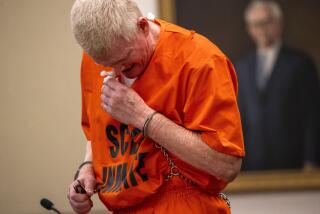Sidebar: In Texas, exonerated former inmates network to help others like them
Isiah Hill looked at the big man on the other side of the prison visitor’s window as if his life depended on him, because it did.
Christopher Scott had done time in prison, too — 12 years for murder. But then another man confessed to the crime, and Scott persuaded a judge he was innocent. In 2009, he walked out of prison, and later received $886,666 in compensation from the state, plus a $4,915 monthly check.
Now Scott was on the other side of the prison bars wearing a glittering diamond pinkie ring, a guide who knew the road to freedom.
Hill, the son of a whiskey bootlegger who’d dropped out of school in sixth grade to pick cotton, couldn’t read. His cellmate had written to Scott, insisting Hill hadn’t committed the motel robbery for which he’d been sentenced to life in prison in 1978.
“Please, get me out of prison, man,” said Hill, 66, on the verge of tears.
“I’ll try,” Scott said.
Texas has the country’s largest prison population and its most active death chamber. It also has exonerated more prisoners than any other state except New York — 152 since 1989, according to the National Registry of Exonerations, a database compiled by the University of Michigan law school.
The number of exonerations here has been boosted by an extensive collection of DNA evidence maintained by the Dallas medical examiner’s laboratory.
But it also has been driven by a network of exonerees like Scott, mostly African Americans with little formal education raised in the inner city, who have used their newfound legal expertise and compensation money to help others still behind bars.
Texas has paid more than $65 million to 96 exonerees, more than a third of them in Dallas, under a compensation statute that is the highest-paying in the nation.
“Usually I point to California as the state of big ideas — progressive. Here we are making progress in the heart of Dixie,” said state Sen. Rodney Ellis, a Houston Democrat who has worked on the issue.
After Scott was freed, he cofounded a nonprofit with other Dallas exonerees to help others who had been wrongfully convicted. He and his colleagues also have lobbied the Legislature to change laws that they believe contributed to their imprisonment. At their urging, state lawmakers last year passed measures to prevent prosecutors from suppressing evidence. They continue to lobby for stricter standards for eyewitness identifications and for more videotaping of interrogations.
“I just want to help somebody else out, because when I was down, there wasn’t anybody there for me,” said Johnnie Lindsey, 61, who served 26 years for rape before he was freed by DNA evidence. His compensation: $1.8 million, plus $11,332 a month.
When Lindsey was sentenced to life in prison in 1983, the Dallas district attorney was Henry Wade, a legend who had prosecuted assassin Jack Ruby. He boasted of a 93% rate of convictions — a number of which were overturned with advances in DNA testing.
By 2008, 19 convictions won by Wade and his successors had been reversed, and Lindsey was among several who sued the authorities responsible for their wrongful convictions.
“The state had to be held accountable,” Lindsey said.
The men offered to abandon their lawsuits if the state increased compensation to $80,000 per year in prison, $25,000 per year on parole or as a registered sex offender. They also wanted access to health insurance, free tuition at state schools and a monthly annuity.
Supporters won votes by citing a high-profile case in the state: that of Timothy Cole, a Texas Tech student and Army veteran who was convicted of raping another student. Cole died of an asthma attack in prison in 1999, at age 39; he was posthumously exonerated in 2009, the same year the law to expand compensation passed overwhelmingly.
“When the state makes a mistake, we need to step up and pay for it,” Ellis said.
::
Scott, 44, was one of the first in the state to be freed without DNA evidence, as he reminded Isiah Hill when they met that day at the prison.
“Don’t give up,” Scott told Hill. “People gave me a million-in-one chance to make it because I didn’t have no DNA, and look at what I’m doing now.”
The Dallas exonerees are still trying to free Hill.
Last year, Lindsey and Scott gathered at a suburban Dallas movie theater and took questions after a screening of a documentary about their private investigation agency, Freedom Fighters. A man up front raised his hand, irate.
“Here’s what I can’t understand,” he said. “How you can have a life without being dominated by anger.”
Scott grinned.
“If we go around being angry,” he said, “we can’t make changes.”
molly.hennessy-fiske@latimes.com
Twitter: @mollyhf
More to Read
Start your day right
Sign up for Essential California for news, features and recommendations from the L.A. Times and beyond in your inbox six days a week.
You may occasionally receive promotional content from the Los Angeles Times.







